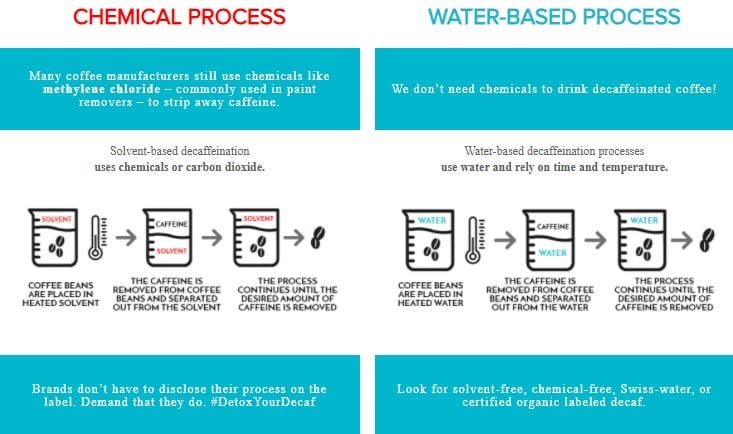
If we are used to drinking coffee, this text interests us, a lot. There are many benefits it has for our health, but there are also contraindications due to excessive caffeine. Coffee, when it is made from natural beans or simply ground, is a healthy product. However, soluble coffees are not recommended, since they are processed coffees with impurities.
It is very common to start the day with a cup of coffee, and there are even those who drink several cups throughout the day. There are also those who alternate between coffee and tea, or those who have switched to coffee because the theine does not give them the effect they need.
Advantages and disadvantages of caffeine
Everything in excess is bad, so as healthy as it is to drink coffee, there is also a negative part. The main drawbacks of caffeine lie in the number of cups of coffee we drink. The recommended maximum is 4 cups of coffee well spaced throughout the dayIf we drink more caffeine than we should, we can suffer arrhythmia, diarrhea, nervousness, insomnia, tremors, irritability, headaches, etc.
On the contrary, if we control caffeine it helps us to be awake and have energy to face the workday, since it stimulates the nervous system. Also, caffeine is related to increased production of neurotransmitters such as serotonin, dopamine, and norepinephrine, which help improve mood.
As if that were not enough, caffeine has a diuretic effect. This means that it helps the body to expel excess salt and fluid through urine.
The danger of decaffeinated coffee
This variety of coffee is not as "natural" as normal, since it has undergone a filtering process to remove caffeine from the beans. This process can be done in a natural, ecological and healthy way with water, or use chemicals such as methylene chloride that is also used in products such as nail polish remover.
In the long term, the consumption of decaffeinated with chemical products causes severe damage to our body, for example, eye damage, dizziness, drowsiness, tingling in the extremities, among others.

Benefits of drinking coffee every day
Hot or iced coffee in the middle of summer is a real pleasure, and not only for our palate, but also for the body. Our body benefits from this classic drink, yes, if it is a good quality coffee.
Those of low quality can contain many impurities and cause intestinal disorders and a general bad body. In large amounts, the risk increases, even damaging the liver.
Energy boost
Caffeine increases adrenaline levels, and is a hormone that prepares the body to face an extraordinary event. What is achieved is that the fat cells break, releasing fatty acids that the body uses as gasoline to face physical exertion.
Coffee contains caffeine, a central nervous system stimulant known for its ability to fight fatigue and increase energy levels. This is because caffeine blocks receptors for a neurotransmitter called adenosine, and this increases the levels of other neurotransmitters in the brain that regulate energy levels, including dopamine.
satiating sensation
Coffee contains phenolics that offer a satiating sensation that causes our brain to send information to the body. In this way, it prevents us from snacking between meals and helps us lose weight, or at least not gain it by snacking throughout the day.
According to some research, coffee might alter fat storage and support gut health, which may be beneficial for weight management. Higher coffee consumption could be associated with a decrease in body fat, especially in men.
In another study, higher coffee intake was linked to decreased body fat in women. Additionally, one study found that people who drank one to two cups of coffee per day were 17% more likely to achieve recommended levels of physical activity, compared to those who drank less than one cup per day. Higher levels of physical activity may help promote weight control.

Improves concentration
Many times we have seen that coffee is used to stay awake and alert, but the benefits of coffee go further and allow you to improve concentration. As an important fact, we emphasize that the maximum recommended caffeine is 4 cups, so exceeding it can give us the opposite effect.
Improves sports performance
Athletes looking to improve performance and increase energy levels often use coffee as an ergogenic aid. An ergogenic aid is also called a performance enhancer.
A review of studies reported that drinking coffee before exercise improved stamina of people and decreased perceived exertion, compared to a control group. Another study found that drinking coffee was associated with better physical performance and faster walking speed, even after researchers adjusted for factors such as age, belly fat, and physical activity levels.
Additionally, a large review reported that moderate caffeine intake could improve power output and the completion time of the time trial. However, the results varied, so the researchers also noted that caffeine may affect people differently.
Reduces the occurrence of diseases
Other benefits of this drink is that it helps us to be healthier, for example, regular coffee consumption reduces strokes, as well as the appearance of Parkinson's, the risk of type II diabetes, and even reduces the risk of Alzheimer's .
Some research suggests that regular coffee consumption may be associated with a lower risk of developing diabetes type 2 in the long term. In fact, a review of studies found that each cup of coffee people consumed per day was associated with a 6% lower risk of developing type 2 diabetes. This is thought to be due to coffee's ability to preserve the function of the cells. beta cells in the pancreas, which are responsible for producing insulin to regulate blood sugar levels.
Additionally, it is rich in antioxidants and can affect insulin sensitivity, inflammation, and metabolism, all of which are involved in the development of type 2 diabetes.
Although studies have produced mixed results, some research suggests that coffee may help protect against certain neurodegenerative disorders, such as Alzheimer's disease. Alzheimer and the disease Parkinson's.
Reduces the occurrence of cancer
One of humanity's greatest burdens, and a disease that little by little is facing up and we are getting closer to a universal cure (hopefully). Regular coffee consumption stimulates intestinal transit and this reduces the occurrence of colon cancer. There are also studies that link several cups of coffee a day with the reduction of breast cancer.

Disadvantages
Having clear the main benefits, now we are going to review the small print, and that is that, no matter how good it is for your health to drink several cups of coffee a day, there are also adverse effects.
Abstinence syndrome
If we have accustomed our body to drinking several cups of coffee at specific times, if one day, for whatever reason, we do not, our body begins to suffer, causing headaches, lack of concentration, fatigue, irritability, sweating, tremors, etc.
It is not recommended to stop consuming coffee from one day to the next, but to gradually reduce the cups and space them out more throughout the day.
Not suitable for pregnant women
If we think we are pregnant, it is best not to choose this drink, in addition, there are studies that link caffeine with fertility problems and complications in assisted reproduction processes. Caffeine can cause spontaneous abortions, not only happens with coffee, but also with energy drinks, soft drinks and even hot chocolates.
Create dependency
It is one thing to drink coffee to wake us up, or to improve concentration during exam time, or because we like it, period, and quite another to drink coffee because it improves our mood. In this specific case, dependency is created, since this drink produces endorphins (happiness hormone). When we don't take it and our character becomes depressed, violent, irritable, etc. It is when we have developed dependency.
Despite all the health benefits of coffee, there's no denying that it can become a habit. Science suggests that although caffeine triggers certain brain chemicals in a similar way to cocaine and amphetamines, it does not cause classic addiction in the way that these drugs do. However, it can cause psychological or physical dependence, especially in high doses.
Also, the frequency of caffeine intake appears to play a role in dependence. Although the compound does not seem to cause true addiction, if we drink a lot of coffee or other caffeinated beverages on a regular basis, there is a high chance that we will become dependent on the effects.

If we have depression or anxiety, do not drink coffee
Caffeine and theine are also present in soft drinks and energy drinks, and this is because they are considered a psychoactive drug capable of changing our brain function, mood and behavior.
It is true that caffeine consumption has been shown to help reduce the effects of depression, but there are those who, after drinking coffee, feel depression and anxiety. If a person with anxiety drinks caffeine, the effects of that disease are reinforced, causing more headaches, insomnia, tremors, restlessness, dizziness, etc.
In the case the consumption of caffeine to which we have accustomed our brain is radically cut, the effects of depression are aggravated, causing intrusive thoughts, headaches, fatigue, irritability, etc. If we are taking medications such as antidepressants or anxiolytics, it is better not to mix it with coffee because there are medications that are incompatible with the effects of caffeine. For example, if we take a medicine to relax, and accompany it with a caffeinated drink, its effect will decrease, even being nullified.